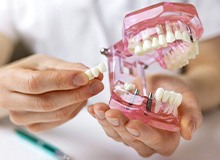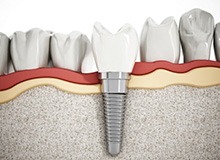Dental Implants — Westfield, NJ
Restore Your Smile and Your Self-Confidence!
For people who have missing teeth, the challenges can be large and varied. Of course, what most affects people with tooth loss is just the knowledge of what others see—a gaping hole in your smile. This often leads to a compromised sense of self-confidence and self-esteem. In addition, tooth loss—even one missing tooth—can cause some degree jaw deterioration. Foods such as fresh fruits and vegetables can be difficult to eat without all of your teeth. Finally, tooth loss can affect your ability to speak clearly—another factor that can contribute to reduced self-confidence at work, school, or leisure.
While a bridge or denture can restore some of the function and appearance of your missing teeth, they only rest atop your gums. As a result, many patients with these oral prosthetic devices experience deterioration of jawbone tissue that can lead to changes in facial structure that age a person’s appearance. In addition, you may miss the permanence and confidence of your old teeth. Fortunately, Dr. David Weinman is certified in dental implants and can restore your missing teeth with this comfortable, permanent treatment. Please contact our Westfield, NJ practice today to schedule your first appointment with our dedicated team. New patients from Springfield, NJ and surrounding areas are always welcomed.
Why Choose Dr. David M. Weinman, DMD For Dental Implants?
- Entire Dental Implant Procedure Completed Under One Roof
- Advanced Dental Technology for Comfortable Treatment & Long-Lasting Results
- Fair, Reasonable Prices with No Hidden Fees
What Are Dental Implants?
A dental implant is a small titanium post that is placed directly into the jawbone to replace the roots of a lost tooth. This provides a much more stable foundation for the replacement teeth when compared to options like dentures or dental bridges that only replace the crowns of missing teeth. The post is then topped with a custom-made restoration to replace the visible part of your missing tooth. Depending on how many teeth you’re replacing, this could be a crown, dental bridge, or denture. Thanks to the durable, high-quality materials this restoration will be crafted out of, they will blend in seamlessly with the rest of your teeth. The end result of rebuilding teeth from the roots up like this is a smile that once again looks, feels, and functions just like natural!
The 4-Step Dental Implant Process
Dr. Weinman has specialized training and expertise in dental implant treatment. This expertise includes every step of the process, including surgical placement and restoration. Placement involves a minor surgery where the implant post(s) will be positioned within your jawbone. Unlike other dental offices, Dr. Weinman can actually handle this procedure in-house, saving you from having to see an outside specialist. Before undergoing your treatment, here are the four main steps of the dental implant process.
Initial Dental Implant Consultation

Your initial consultation will always be the first part of getting dental implants. This appointment is crucial so that our team can examine your oral health and assess your jawbone to determine if this is the best solution for restoring your missing teeth. We’ll also walk you through the entire process and provide you with a more precise estimate of the cost so that you know what to expect.
If it’s necessary, our team can also perform preliminary treatments if your jawbone density isn’t sufficient or you have another underlying oral health issue. These may involve gum disease treatment, bone grafting, and even tooth extractions. Once you’ve recovered, we can then move forward with your dental implant process.
Dental Implant Surgery

Our team can perform the entire treatment in-office, so you won’t have to worry about getting treated by a specialist on the other side of town. Once you arrive, we’ll get you settled and administer a local anesthetic in your mouth so that you remain completely pain-free throughout your visit. We might even provide you with sedation dentistry to relax you even further for a more comfortable experience. After confirming that you’re safe and well, we’ll make a tiny incision in your gums to reach your jawbone and place your dental implants in their preplanned locations. We’ll close the gums around them and cover them with protective caps so that you can heal safely.
Dental Implant Osseointegration & Abutment

It should typically take around three to six months to completely recover from your dental implant surgery. During this time, the metal posts will need to undergo a process called osseointegration, where they fuse with the jawbone. This will create the incredible and lifelike foundation necessary for long-lasting and natural-feeling restorations. After you’ve healed, you’ll return to us to receive your abutments—metal connector pieces that link your restorations to the posts.
Delivery of Dental Implant Restoration(s)

Once your gums are recovered from getting your abutments, you’ll come back to our office for your final restorations. Your new dental crown, bridge, or denture will be fixed to your implants, and we’ll double-check if your bite is proper and comfortable before sending you on your way. We’ll also provide aftercare guidelines so that you can make the most of your brand-new smile for many years to come.
Benefits of Dental Implants
When you have missing teeth in your smile, it can make it extremely difficult to show it off. For many, this is the main concern they have with their tooth loss, and it can really leave a damaging effect on your self-esteem. Thankfully, dental implants restore your appearance in more ways than one as well as ensure many other long-term benefits you may not have expected. Below, you’ll find a handful of the most notable benefits that you won’t find with other methods of tooth replacement. Call our office today to schedule your very first dental implant consultation!
Regain Your Smile, Maintain Your Appearance

When a tooth is lost, the bone tissue begins to break down, which only affects your natural appearance further. In fact, your face can begin to prematurely sag and your cheeks can start to hollow out. Since dental implants replace the entire tooth structure, not just the visible crown, you can expect comprehensive restoration to your face, not just your smile.
Eat the Foods You Want

Even dentures and dental bridges can make it difficult to chew certain foods with confidence. The key with dental implants is it stimulates bone tissue once they are placed, which means your jaw’s fullest biting force comes back. Chewing steak, apples, and other tough or crunchy food is possible again after your implant treatment is complete.
Prevent Bone & Tissue Atrophy

When teeth are no longer stimulating bone tissue inside of your jaw, that causes the bone to break down and resorb back into the body where it’s needed. Unfortunately, this also results in a higher risk of future tooth loss. With the help of an implant, your bone tissue stays in place, preventing your jaw from atrophying and changing shape.
Take Care of Your Existing Teeth

In the case of dental bridges, you will need to have existing teeth modified so they can hold a dental bridge. Instead of removing valuable tooth enamel, dental implants rely on titanium posts to act as the foundation for your replacement tooth.
Easier Maintenance

Dental bridges can be difficult to clean, and dentures (especially removable ones) can be hard to maintain, particularly if you are older and not as dexterous as you may have remembered. Since dental implants are fixed, you just need to practice daily oral care and visit the dentist regularly to keep your smile looking good and your oral health in good shape.
Experience a Long-Lasting Solution

While dental bridges and dentures can prevent many problems caused by tooth loss, they often do not stand the test of time like dental implants do. In fact, dental implants are designed to last well over 30 years without issue. In most cases, they remain healthy for the remainder of the patient’s life, which is far different than the 5 to 10 year lifespan that dentures and dental bridges maintain.
Who Dental Implants Can Help
One of the key advantages of dental implants is that they can be a great option in all sorts of situations. With the right number of implant posts and a personalized restoration, it’s possible to replace any number of teeth. As part of your initial consultation, we will take the time to determine whether you are able to get dental implants, and we’ll help you figure out exactly what the procedure will look like based on your needs.
Who Is a Good Candidate for Dental Implants?

Most healthy adults are able to get dental implants, which is a large part of the reason why they have become increasingly popular as a tooth replacement method. To be a viable dental implant candidate, you must meet these criteria:
- Your body should be in good enough health for minor surgery to be performed.
- Your mouth needs to be healthy. Gum disease can significantly increase your risk for dental implant failure, and other oral health issues can potentially cause complications as well.
- There’s plenty of bone in your jaw. Dental implants need to form a lasting bond with your jaw, and they can only do that if there’s enough bone density.
At your initial consultation, we can help you determine whether you currently meet these criteria or if you need to have preparatory treatments done first.
Missing One Tooth

A single dental implant can be inserted into the empty space where a tooth used to be. The implant post will gradually become integrated with the bone around it; eventually, it will be able to support a dental crown, which can be carefully personalized in order to blend in seamlessly with the rest of your smile.
Missing Multiple Teeth

Two dental implants can be used to support a dental bridge. This can be a great option if you have lost at least three consecutive teeth. Implant bridges are different from traditional bridges because they don’t require the removal of any enamel. As such, you will be able to keep more of your natural smile intact.
It’s also possible to attach a partial denture to a specific number of strategically placed dental implants. This might be suggested if you have lost multiple teeth that were in different locations.
Missing All Teeth

An implant denture is very different from a traditional denture. It does not sit on the gums; instead, it is anchored in place by four or more dental implant posts. This means it won’t slip at awkward moments and allows for a more varied diet.
You can get removable implant dentures that can be taken out of your mouth at any time. However, many patients prefer fixed implant dentures instead. With this option, your replacement teeth will always stay in your mouth; as a result, you can brush them the same way you would your natural teeth, which makes them very easy to maintain.
Understanding the Cost of Dental Implants

Your dental implant treatment will not look exactly the same as another patient’s, as each individual’s needs are different. Many factors can influence the cost, including the type of restoration used, the number of implants you’re receiving, the preparatory treatments necessary to make implant possible (i.e. bone grafts and sinus lifts) and other factors.
However, it’s important to note that dental implants are considered a long-term investment. Their longevity and durability makes them the most cost-effective option for replacing teeth. Dental implants are able to last decades while other treatments need to be replaced every 5-7 years.
Dental Implant Failure and Salvage

When it comes to dental implants, we always aim to maximize our patients’ chances of success. Nevertheless, in the unlikely event that your dental implants fail, please call our office immediately. After examining your mouth, we can help you figure out what caused the failure, and we can explain the best next steps to take in order to protect your newly rebuilt smile. Don’t worry if you need to have your dental implants removed; oftentimes you’ll be able to get new ones once your mouth is healthy again.
